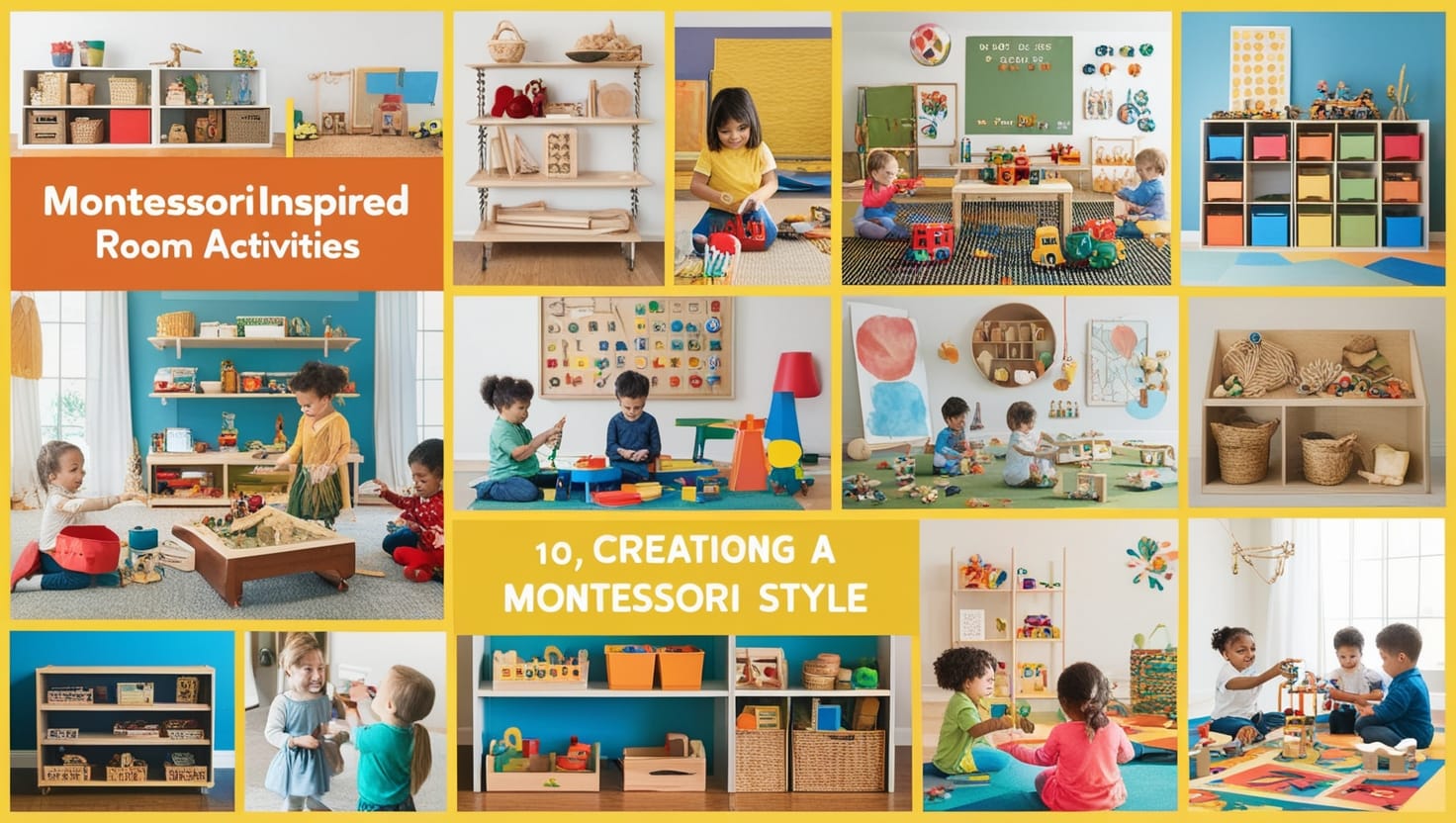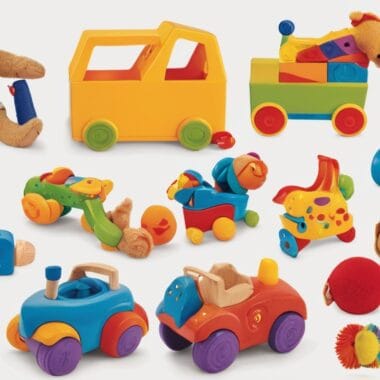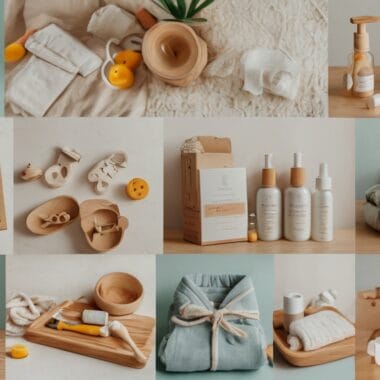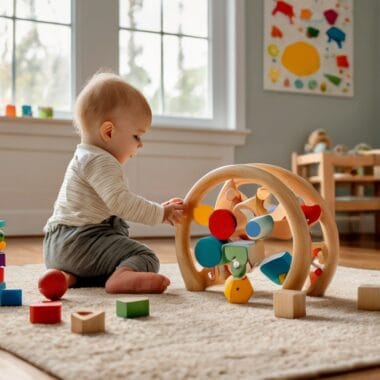-

- Baby playing with Montessori toys in a minimalist room designed to encourage physical development through exploration and play
-

- Collection of must-have Montessori toys like wooden stacking rings and shape sorters for activities to encourage physical development in infants.
-

- DIY Montessori sensory board and homemade fabric balls to support activities to encourage physical development in infants.
-

- Parent ensuring safe play with Montessori toys, creating a secure environment for activities to encourage physical development in infants.
When designing a Montessori-inspired room for your little one, it’s all about creating an environment that encourages independent exploration and learning. Key elements like low shelves, natural materials, and uncluttered spaces are essential. These features not only make the room aesthetically pleasing but also serve a functional purpose. For instance, low shelves allow your child to access toys and books easily, promoting independence and decision-making skills. Using natural materials like wood and cotton fosters a connection to the natural world, which is crucial for sensory development. Moreover, an uncluttered space ensures your baby isn’t overwhelmed, making it easier to focus on activities to encourage physical development in infants.
Incorporating these Montessori room features can transform your space into a nurturing environment. Remember, the goal is to create a room that meets your child’s developmental needs and encourages them to engage with activities to encourage physical development in infants. Keeping the room organized and filled with natural elements will help your child feel more grounded and in touch with their surroundings. By using a minimalist approach, you’re also teaching them the value of simplicity and focus, both of which are vital skills they will carry throughout their lives.
The Magic of Low Shelves
Low shelves are more than just furniture; they are a gateway to independence for your child. Placing toys and books on these shelves at their eye level allows them to choose what they want to explore. This choice-making process is a simple yet powerful activity that encourages physical development in infants. By reaching for a toy or a book, they are not only engaging their fine motor skills but also learning to make decisions on their own. This kind of independence is a fundamental principle of the Montessori method and sets the stage for lifelong learning and self-reliance.
Embrace Natural Materials for a Sensory Experience
Natural materials like wood, cotton, and wool are staples in any Montessori room. These materials are safe, durable, and provide varied textures that are perfect for sensory exploration. Activities to encourage physical development in infants often involve engaging multiple senses, and natural materials are ideal for this. Wooden toys, for example, can be smooth or textured, light or heavy, and each characteristic offers a different experience for your baby. Incorporating natural materials also introduces your child to the beauty of the natural world, fostering an early appreciation for their environment.
Budget-Friendly Decor Tips: Designing a Montessori Room on a Dime
You don’t need a hefty budget to create a beautiful and functional Montessori-inspired room. In fact, many budget-friendly decor tips can help you achieve this without breaking the bank. Start by repurposing items you already have. For example, a simple bookshelf can be converted into a low shelf by removing the legs or lowering it. This not only saves money but also gives a second life to furniture you already own. Think about using everyday household items in new ways—wooden spoons, cloth napkins, or woven baskets can all be great additions to a Montessori room.
Another great tip is to shop second-hand or visit thrift stores. You can often find high-quality, gently used furniture and toys that fit perfectly into a Montessori-inspired space. Look for items made of natural materials like wood or metal, which are often more durable and sustainable than plastic alternatives. You’d be surprised how many treasures you can find that will complement your room’s aesthetic and provide engaging activities to encourage physical development in infants.
Upcycling and DIY Decor Hacks
Get creative with upcycling to add unique touches to your Montessori room. You can paint old wooden crates to use as storage or even stack them to create shelves. An old picture frame can become a mirror at your baby’s eye level, which is perfect for encouraging self-recognition and activities to encourage physical development in infants. Use your creativity and see what items you can repurpose. Not only will you save money, but you’ll also have a room filled with character and charm that reflects your personal touch.
Sourcing Affordable Montessori Toys: Finding Cost-Effective Learning Tools
Finding affordable Montessori toys doesn’t have to be a daunting task. There are many places where you can source high-quality, cost-effective Montessori toys and materials. One of the best places to start is online marketplaces. Websites like eBay, Etsy, or even Facebook Marketplace often have Montessori toys for a fraction of the cost. When looking for these toys, focus on those that promote activities to encourage physical development in infants, like stacking blocks, shape sorters, or soft fabric books.
You can also check local community groups or parenting networks. Often, parents are looking to pass on toys their children have outgrown, and you can find excellent deals or even free items. Remember to always inspect these toys for safety and cleanliness. Prioritize toys that encourage fine and gross motor skills, as these are vital activities to encourage physical development in infants.
Shop Smart and Think Long-Term
Investing in a few high-quality, versatile toys is more beneficial than buying a multitude of cheaper, less durable ones. Think about toys that grow with your child, such as wooden blocks, which can be used in numerous ways as your child develops. Consider subscribing to a toy library or swap program, where you can borrow toys and exchange them as your child’s interests change. This is a great way to keep the toy rotation fresh and ensure your child is always engaged in new activities to encourage physical development in infants.
DIY Projects for a Montessori Room: Get Creative and Save Money
DIY projects are an excellent way to create a Montessori-inspired room on a budget. Plus, they offer a personal touch and a sense of accomplishment. One simple DIY project is making a sensory board. All you need is a wooden board and various textured materials, like sandpaper, fabric scraps, and small household items like locks or wheels. This is an excellent tool for activities to encourage physical development in infants, as it helps them develop fine motor skills and tactile exploration.
Another fun DIY idea is to create a soft, cozy reading nook. Use cushions, a small rug, and some fabric to make a canopy. This space will encourage quiet time and concentration, key aspects of the Montessori method. You can also make simple toys, such as sensory bottles filled with different materials like rice, beans, or colorful beads. These DIY toys can provide endless fun and are great for activities to encourage physical development in infants.
Craft a Personal Touch
Adding a personal touch to your Montessori room with DIY projects is rewarding and cost-effective. You can create custom name plaques, paint your own artwork, or make a mobile with natural elements like feathers, twigs, and leaves. These personal touches make the room feel unique and special. Plus, they are perfect conversation starters as your child grows and begins to ask about the items around them.
Creating a Montessori room doesn’t have to be expensive or complicated. By focusing on essential features like low shelves, natural materials, and uncluttered spaces, and incorporating budget-friendly tips and DIY projects, you can create a beautiful and functional space. Remember to keep your child’s needs in mind and select activities to encourage physical development in infants. And if you’re looking for more inspiration, check out our review of the product “Wooden Montessori Coffee Maker” which is perfect for enhancing your Montessori room.









